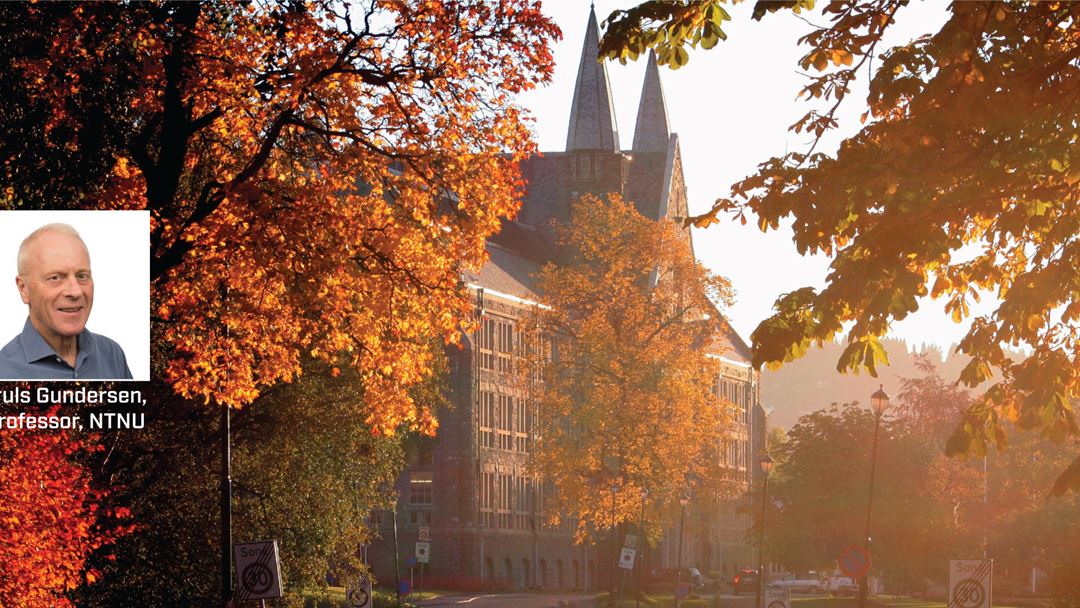Teaching industry an integrating approach to energy efficiency
If HighEFF is to succeed with its ambition to transform Norwegian industry over the long-term, then finding ways to effectively transfer knowledge from research into practical industrial use is essential. To kick-start that important goal of HighEFF, Scientific Leader Truls Gundersen has put together an energy efficiency course that he will deliver to a diverse cross-section of Norwegian industry during 2020.

While partly based on knowledge first gained during the 1980s such as the Pinch Concept, the course is geared towards the specific needs of Norwegian industry by including new applications for that previous knowledge and recent developments at NTNU and within HighEFF that consider a more integrated approach to energy efficiency. "We look not only at heat, but how heat and power interact," explains Truls.
That will be achieved through a series of four lectures. Heat integration will be covered through the analysis and targeting of industrial heat recovery systems, the design of heat recovery systems with focus on heat exchanger networks and integration of heat pumps, heat engines and distillation columns, and the retrofit of existing heat recovery systems. Finally, heat and work integration will come under the spotlight with a brief introduction to exergy, a method for assessing energy quality in order to make better comparisons within a system.
Much of what is taught will challenge common practice in industrial plants such as the operational conditions of compressors and expanders. Truls expects some of the participants to be surprised about the alternative approach: "When you consider the overall heating and cooling requirements of the plant as one integrated system, the picture is completely different. We suggest it's more energy efficient from an overall system perspective to run compressors at a high temperature. Not the highest possible temperature, but in such a way that compression heat can be given away above the pinch point. This is based on many examples, both theoretical and industry-like case studies that show the benefits."
Although there can be a reluctance to change in traditional industries, the potential financial benefits resulting from an integrated approach to energy efficiency can provide the necessary incentives. Not only is it good for the environment, it's good for the bottom line too. "Everyone agrees that the greenest energy is the one that is never used, so we need to find methods to make that happen, and then communicate them," says Truls.
Thermodynamic principles
Many thermodynamic concepts are used within engineering analyses of industrial processes ranging from individual plants to total sites. The course will introduce some of them in the context of integrated energy systems.
The Pinch Concept: A process engineering methodology that can help find energy-saving opportunities in industrial contexts. The Pinch temperature is a function of process stream data and a specified minimum temperature difference in heat exchangers, and it decomposes the process into a heat deficit and a heat surplus region. This fundamental decomposition guides the design of all heat recovery systems.
Exergy: A measure of energy quality, or the capacity of energy to produce work. The technical definition is the maximum useful work which can be extracted from a system as it reversibly comes into equilibrium with its environment.
However, simply approaching the problem by seeking out quick wins is not necessarily the best for long- term results. Truls promotes an integrated systems approach that can sometimes be at odds with an "energy hunter" approach that focuses on end-of-pipe solutions. "The kind of methodology we are teaching goes deep into the process to uncover potentially significant savings. HighEFF shows that investment in energy efficiency measures can be profitable for industry," says Truls.
HighEFF Chairman of the Board Arne Ulrik Bindingsbø has encouraged his colleagues in Equinor to attend, even though he says that Norwegian land-based industry and offshore oil & gas production are already among the world leaders in energy efficiency compared to similar industries in other countries: "Nevertheless, the greenhouse gas emissions from these operations account for a large part of Norway’s total emissions. There is a need for technology development and subsequent implementation to further increase the energy efficiency and reduce the greenhouse gas emissions."
He adds that another important reason for professionals to attend is that the topics of energy efficiency and CO2 emissions are complex and multidiscipline: "People working within the area have a wide range of backgrounds and there is a clear need to increase the basic competence for several of us, on both the basic theory and its applications."
That basic competence includes existing theory such as Pinch Analysis, a thermodynamics fundamental that isn't always used in the analysis and design of heat recovery systems where it can often provide hidden insights. Other teaching will be based in part on recent findings from NTNU and the FME HighEFF.
"I expect another big takeaway from the course to be the insights we provide in dealing with the simultaneous integration of heat pumps, distillation columns and so on. There has been a lot of HighEFF-funded PhD work at NTNU on these topics," says Truls.
Course participants will learn a methodology that the hydrocarbon industry has used to make substantial savings over the years. But it applies just as much to smaller factories such as pulp and paper or dairies. Because the methods are systematic, they can be applied to almost all energy-intensive operations, irrespective of industrial sector.
Should the course be received well, there are plans for further courses throughout the life of FME HighEFF. "At the very beginning of HighEFF our industrial partners suggested that short courses were desirable. The need to improve energy efficiency is urgent, so while education through Master and PhD programmes remains important, giving Norwegian industry the tools they need to make a difference today is equally important. That's how HighEFF can make an immediate impact and leave a lasting legacy."
